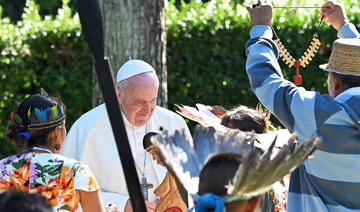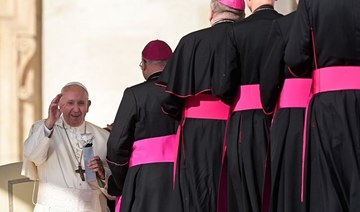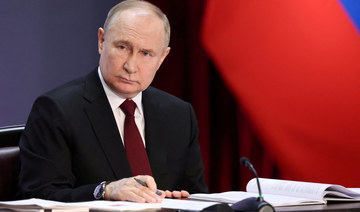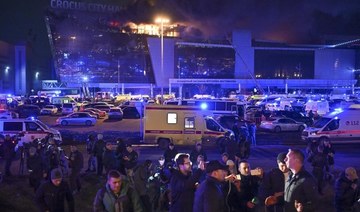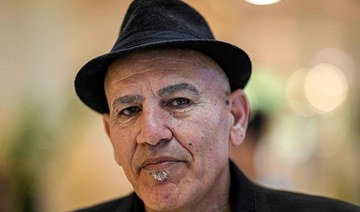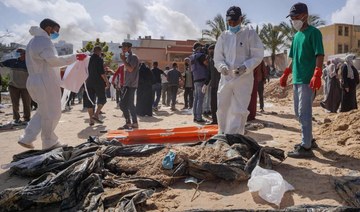VATICAN CITY: Catholic bishops from across the Amazon called Saturday for the ordination of married men as priests to address the clergy shortage in the region, a historic proposal that would upend centuries of Roman Catholic tradition.
The majority of 180 bishops from nine Amazonian countries also called for the Vatican to reopen a debate on ordaining women as deacons, saying “it is urgent for the church in the Amazon to promote and confer ministries for men and women in an equitable manner.”
The proposals were contained in a final document approved Saturday at the end of a three-week synod on the Amazon, which Pope Francis called in 2017 to focus attention on saving the rainforest and better ministering to its indigenous people.
The Catholic Church, which contains nearly two dozen different rites, already allows married priests in Eastern Rite churches and in cases where married Anglican priests have converted. But if Francis accepts the proposal, it would mark a first for the Latin Rite church in a millennium.
Still, the proposals adopted Saturday also call for the elaboration of a new “Amazonian rite” that would reflect the unique spirituality, cultures and needs of the Amazonian faithful, who face poverty, exploitation and violence over the deforestation and illegal extractive industries that are destroying their home.
Francis told the bishops at the end of the voting that he would indeed reopen the work of a 2016 commission that studied the issue of women deacons. And he said he planned to take the bishops’ overall recommendations and prepare a document of his own before the end of the year that will determine whether married Catholic priests eventually become a reality in the Amazon.
Some conservatives and traditionalists have warned that any papal opening to married priests or women deacons would lead the church to ruin. They accused the synod organizers and even the pope himself of heresy for even considering flexibility on mandatory priestly celibacy.
They vented their outrage most visibly this week when thieves stole three indigenous statues featuring a naked pregnant woman from a Vatican-area church and tossed them to into the Tiber River.
The statues, which conservatives said were pagan idols, were recovered unscathed by Italy’s Carabinieri police. One was on display Saturday as the synod bishops voted on the final document, which was approved with each paragraph receiving the required two-thirds majority.
The most controversial proposals at the synod concerned whether to allow married men to be ordained priests, to address a priest shortage that has meant some of the most isolated Amazonian communities go months without a proper Mass. The paragraph containing the proposal was the most contested in the voting, but received the required majority 128-41.
The proposal calls for the establishment of criteria “to ordain priests suitable and esteemed men of the community, who have had a fruitful permanent diaconate and receive an adequate formation for the priesthood, having a legitimately constituted and stable family, to sustain the life of the Christian community through the preaching of the Word and the celebration of the sacraments in the most remote areas of the Amazon region.”
The paragraph ended by noting that some participants wanted a more “universal approach” to the proposal — suggesting support for married priests elsewhere in the world.
The celibate priesthood has been a tradition of the Latin Rite Catholic Church since the 11th century, imposed in part for financial reasons to ensure that priests’ assets pass to the church, not to heirs.
Francis has long said he appreciates the discipline and the gift of celibacy, but that it can change, given that it is discipline and tradition, not doctrine.
History’s first Latin American pope has been particularly attentive to the argument in favor of ordaining “viri probati” — or married men of proven virtue — in the Amazon, where Protestant and evangelical churches are wooing away Catholic souls in the absence of vibrant Catholic communities where the Eucharist can be regularly celebrated.
The second-most contested proposal concerned ordaining women deacons, a type of ministry in the church that allows for preaching, celebrating weddings and baptisms, but not consecrating the Eucharist.
The synod bishops didn’t come straight out and call for women deacons, but rather for the Vatican’s 2016 commission of study on the female diaconate to hear from the synod about “our experiences and reflections” and make a decision. The paragraph passed 137-30.
Francis in 2016 agreed to a request from the international organization of religious sisters to set up a study commission to explore the role of women deacons in the early church, answering an insistent call for women to have greater decision-making, governance and ministerial roles given that the Catholic priesthood is reserved for men.
The commission delivered its report to Francis but the results were never released and Francis subsequently said there was no agreement among commission members.
Pope’s Amazon synod proposes married priests, female leaders
Pope’s Amazon synod proposes married priests, female leaders

- Proposals contained in a final document approved Saturday at the end of a three-week synod on the Amazon
- The celibate priesthood has been a tradition of the Latin Rite Catholic Church since the 11th century
Britain’s home secretary touts UK-Rwanda migrant deportation deal during visit to Italy
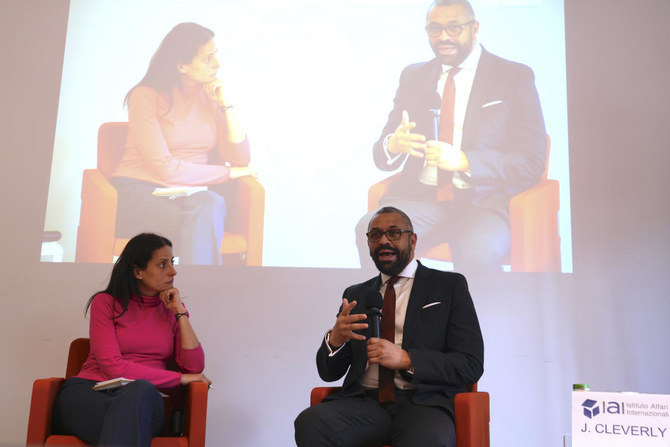
- Deal, in which Britain will pay Rwanda to process the migrants, is aimed at deterring people from crossing the English Channel from France
- It is similar in some basic aspects to Italy’s controversial pact to outsource the processing of asylum-seekers to Italian-run centers in Albania
Home Secretary James Cleverly visited Italy, ground zero in Europe’s migration debate, hours after the UK Parliament approved legislation to enable the government to deport some people to Rwanda who enter Britain illegally.
The deal, in which Britain will pay Rwanda to process the migrants, is aimed at deterring people from crossing the English Channel from France. It is similar in some basic aspects to Italy’s controversial pact to outsource the processing of asylum-seekers to Italian-run centers in Albania.
Human rights groups have said both deals, forged by conservative governments amid anti-migrant sentiment among voters, violate the rights of migrants that are enshrined in international refugee conventions.
On Tuesday, the UN High Commissioner for Refugees said the UK-Rwanda deal is “not compatible with international refugee law” because it uses an asylum model “that undermines global solidarity and the established international refugee protection system.”
Cleverly defended the deal as a necessary response to a problem that has outgrown the international institutional way of processing migrants. He said Britain will not tolerate people smugglers determining who arrives on British soil.
“People-smuggling mass migration has changed (and) I think demands us to be constantly innovating,” he told a gathering at the Institute of International Affairs, a Rome-based think tank.
He said he took seriously the UNCHR criticism and said Britain was a law-abiding country.
“Of course we will respect the UN enormously,” he said when asked about the UNHCR criticism. “We take it very, very seriously. Doesn’t mean to say we always agree with their assessment. But we will, of course, look at that.”
Cleverly visited the Italian coast guard headquarters on Tuesday and on Wednesday is to visit the Sicilian island of Lampedusa, where tens of thousands of migrants have arrived after crossing the Mediterranean Sea on boats setting off from northern Africa.
Lampedusa is closer to Africa than the Italian mainland and is often the destination of choice for migrants, whose numbers reached 157,652 new arrivals in Italy last year.
The numbers arriving in Italy so far this year are actually way down, presumably thanks to Italy’s European Union-endorsed agreement with Tunisia to stem departures. As of Tuesday, 16,090 migrants had arrived by sea in Italy so far this year, compared to 36,324 in this period last year.
Spain has actually outpaced Italy so far this year in terms of migrant sea arrivals, with 16,621 arriving this year as of April 15, the last available date.
In Britain, the numbers pale in comparison to the southern Mediterranean, even during peak periods: In 2022, the number of people arriving in Britain from across the Channel reached 45,774, though last year the number dropped to 29,437.
Ukraine suspends consular services abroad for men of fighting age

- Ukraine’s foreign affairs ministry “announced a temporary suspension of accepting new applications for consular services” for men between 18 and 60
- It made an exception for documents allowing Ukrainians to return to Ukraine
KYIV: Ukraine authorities on Tuesday suspended consular services for men of fighting age living abroad, after announcing measures to bring them home amid manpower shortages in the army fighting Russia.
Ukraine’s army has been struggling to hold frontlines, partly due to a lack of soldiers over two years into Russia’s invasion.
Ukraine’s foreign affairs ministry “announced a temporary suspension of accepting new applications for consular services” for men between 18 and 60.
It made an exception for documents allowing Ukrainians to return to Ukraine.
The move would likely oblige Ukrainian men to return from abroad to undergo administrative procedures that were previously available abroad.
The government has already adopted a mobilization law, due to come into force on May 18, that toughens penalties against draft dodgers and obliges men to keep their military registration up-to-date.
The ministry said men would be able to access consular services once the law came into force and “after updating their military registration.”
“Male citizen of Ukraine aged 18 to 60 with valid military registration documents will have full access to consular services,” the ministry said.
Ukrainian men have been forbidden to leave the country since the invasion began, apart from a few exceptions.
But some lived away before the war began, and Ukrainian media estimates that thousands more illegally fled the country.
Major arrests at NYU campus as Gaza protests spread
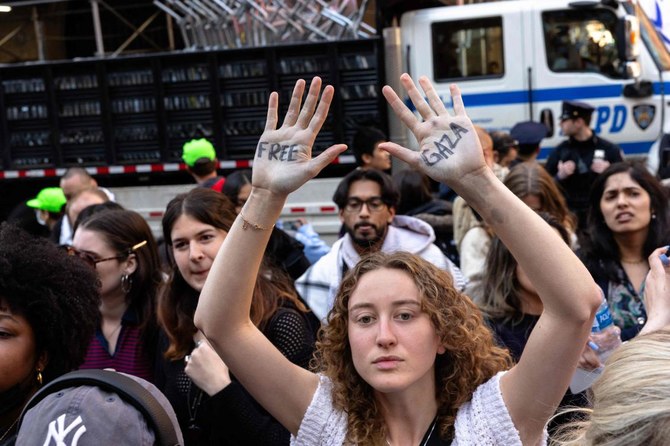
- Some of America’s most prestigious universities have been rocked by protests in recent weeks
- On Tuesday, the New York Police Department said 133 people had been arrested at NYU and released after being issued with court summons
NEW YORK: More than 130 people were arrested overnight during pro-Palestinian protests at the New York University campus, as student demonstrations gather pace in the United States over the Israel-Hamas war.
Some of America’s most prestigious universities have been rocked by protests in recent weeks as students and other agitators take over quads and disrupt campus activities.
The demonstrations come amid sweeping debates over Israel’s assault on Gaza, following Hamas’s deadly invasion on October 7.
Such bastions of higher education — Harvard, Yale, Columbia and others — are grappling for a balance between students demanding free speech rights and others who argue that campuses are encouraging intimidation and hate speech.
On Tuesday, the New York Police Department told AFP that 133 people had been arrested at NYU and released after being issued with court summons, as protests also intensify at Yale, Columbia University and other campuses.
As the holiday of Passover began Monday night, police began detaining demonstrators at an encampment at NYU who had earlier refused orders to disperse.
A New York University spokesman said the decision to call police came after additional protesters, many of whom were not thought to be affiliated with NYU, suddenly breached the barriers erected around the encampment.
This “dramatically changed” the situation, the spokesman said in a statement on the school’s website Monday, citing “disorderly, disruptive and antagonizing behavior” along with “intimidated chants and several antisemitic incidents.”
“Given the foregoing and the safety issues raised by the breach, we asked for assistance from the NYPD. The police urged those on the plaza to leave peacefully, but ultimately made a number of arrests.”
The spokesman said the school continues to support freedom of expression and the safety of students.
But protests have grown large and disruptive enough — New York Police Department spokesmen have spoken of their officers facing violence when confronting protesters at NYU — to draw the attention of President Joe Biden and his administration.
“Anti-Semitic hate on college campuses is unacceptable,” US Secretary of Education Miguel Cardona posted on X on Tuesday, expressing concern about the unrest.
The protests began last week at Columbia University, also in New York, with a large group of demonstrators establishing a so-called “Gaza Solidarity Encampment” on school grounds.
But more than 100 protesters were arrested after university authorities called the police onto Columbia’s campus Thursday, a move that seemingly escalated tensions and sparked a greater turnout over the weekend.
Social media images late Monday appeared to show pro-Palestinian Jewish students holding traditional seder meals inside the protest areas on campuses including at Columbia.
There were also demonstrations at MIT, the University of Michigan, UC Berkeley and Yale, where at least 47 people were arrested Monday after refusing requests to disperse.
France arrests eight in PKK financing probe
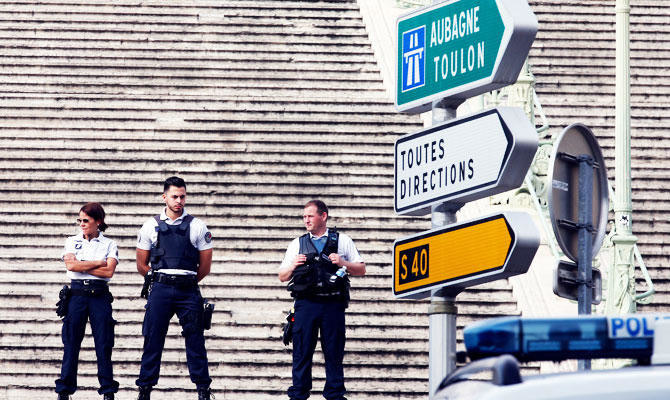
- The arrests took place in the Paris region and in southern France, the PNAT anti-terror unit said
- French prosecutors suspect the eight of preparing and financing terrorist acts
PARIS: French police arrested eight men on Tuesday as part of an investigation into the finances of the Kurdistan Workers Party (PKK), banned as a terror organization by Turkiye and its Western allies, anti-terrorism prosecutors told AFP.
The arrests took place in the Paris region and in southern France, the PNAT anti-terror unit said.
The PKK has been designated a terrorist organization by Turkiye, the United States and the European Union.
French prosecutors suspect the eight of preparing and financing terrorist acts, and of conspiring to extort, or attempt to extort, funds to finance a terrorist organistion between 2020 and 2024, the PNAT said.
Investigators believe the eight to be connected to a campaign to collect funds from Kurdish business people and other Kurds in France, a source close to the case added.
Police can hold the suspects for up to 96 hours for questioning, the source said.
Another source said the funds were destined for use in Belgium, where police on Monday raided Kurdish-run media as part of a probe undertaken at the request of a French anti-terror judge, the PNAT said.
The PKK has waged a decades-long insurgency for greater autonomy for the Kurdish minority of Turkiye in the southeast of the country, in a standoff with the Ankara government that remains unresolved to this day.
Dutch intelligence sees the wars in Gaza and Ukraine as triggers for terrorist threats
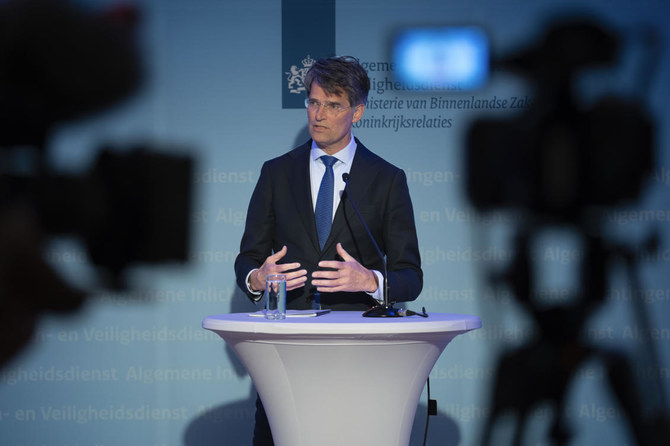
- The Israel-Hamas war in Gaza and the destruction of a Qur’an outside parliament last year are “trigger events” for extremists
- “The terrorist threat is serious at this moment,” the agency’s director-general, Erik Akerboom, told AP
ZOETERMEER, Netherlands: The Dutch national intelligence agency said Tuesday that threats targeting the Netherlands are increasingly connected to worldwide turmoil, including the wars in Gaza and Ukraine.
Although the number of terror attacks across Europe has been down in recent years, the General Intelligence and Security Service in its annual report said the Israel-Hamas war in Gaza and the destruction of a Qur’an outside parliament last year are “trigger events” for extremists.
“The terrorist threat is serious at this moment,” the agency’s director-general, Erik Akerboom, told The Associated Press.
Akerboom said he is particularly concerned about big events, noting that the agency is working closely with French authorities to prevent incidents during the Paris Olympics this summer.
In December, the Dutch counterterrorism agency increased the country’s threat alert to its second-highest level because of concerns about the Daesh group’s Khorasan affiliates, Akerboom said. IS-K, a Central Asian affiliate, was responsible for the attack at a suburban Moscow concert hall that killed at least 133 people in March.
According to the new report, “global jihadism has been the greatest terrorist threat for years in the Netherlands.” Incidents such as the one last April, when an anti-Islam activist tore pages from the Qur’an in front of the Dutch parliament building, put the Netherlands on the map of targets.
About a dozen terror attacks were thwarted by authorities in Europe last year and in four cases, suspects were arrested in the Netherlands, the report said. None of those attacks was focused on the Netherlands, according to Akerboom.
The Dutch also see threats from China, in particular cyberattacks, as a major concern. Akerboom said China is producing more hackers to break into Dutch systems than the Dutch can produce to defend them. The security service has cited China as the biggest threat to the country’s economic security.
Russia also continues to pose a risk to the Netherlands amid Moscow’s full-scale invasion of Ukraine. So-called peace protests in Amsterdam which call for the Dutch to stop sending arms to Ukraine have included demonstrators paid by Russian sources to attend and given prefabricated slogans, the security service has asserted.
The Netherlands is of particular interest to Moscow in part because of the international institutions housed here, including the International Criminal Court. The Hague-based court is investigating crimes in Ukraine and has issued arrest warrants for President Vladimir Putin and other Russians.



